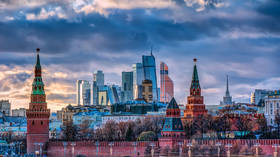Kremlin defends harsh ‘fake military news’ law

The Kremlin has insisted that making it illegal to spread “fake news” about its ongoing military offensive in Ukraine was a proper response to the alleged propaganda war waged by the West.
The harsh measures were “necessary and urgently needed during these difficult times,” Dmitry Peskov, spokesman for President Vladimir Putin, told reporters on Saturday, citing “an information war waged against our country.”
“Given the state of the information war [against Russia], we had to adopt a law of appropriate severity, which we did,” the spokesman argued. Vyacheslav Volodin, the speaker of the State Duma, the lower house of the country’s parliament, said the change will help to punish those who have “lied” about Russia’s military actions.
Some journalistic groups and individual reporters condemned the new laws. International Press Institute Deputy Director Scott Griffen accused Moscow of trying to “silence all independent reporting which dares to tell the truth about the horrific human cost of the conflict.”
On Friday, Russia’s media regulator Roskomnadzor blocked access to several liberal news outlets, including Ekho Moskvy radio, Dozhd TV channel, and the Latvian-based Russian-language website Meduza, arguing that they were reporting falsehoods about the Russian campaign in Ukraine. Meduza blasted the action as “censorship.”
The regulator also blocked access to several websites of Western media, including the BBC, Deutsche Welle, Voice of America, and Radio Free Europe/Radio Liberty. The move came after the EU banned RT, as well as Russian news agency Sputnik, citing “information manipulation and disinformation.”
The new law, adopted in Russia on Friday evening, made the deliberate spread of “false information” about the Russian military punishable by up to 15 years in jail and a heavy fine.
Similarly, people found guilty of “discrediting” the use of the Russian Armed Forces for “the protection of the interests of the Russian Federation and its citizens” can be jailed for up to five years and fined.













